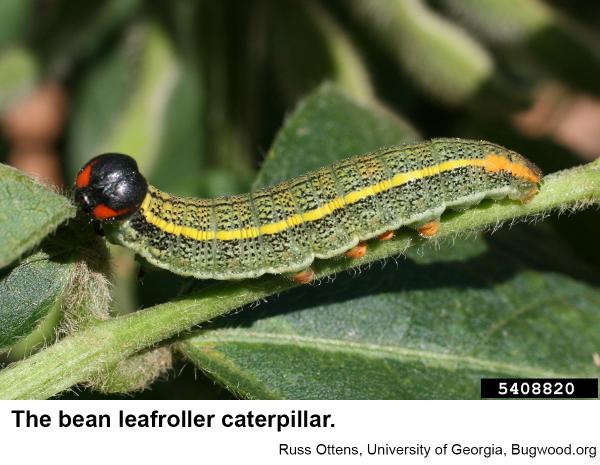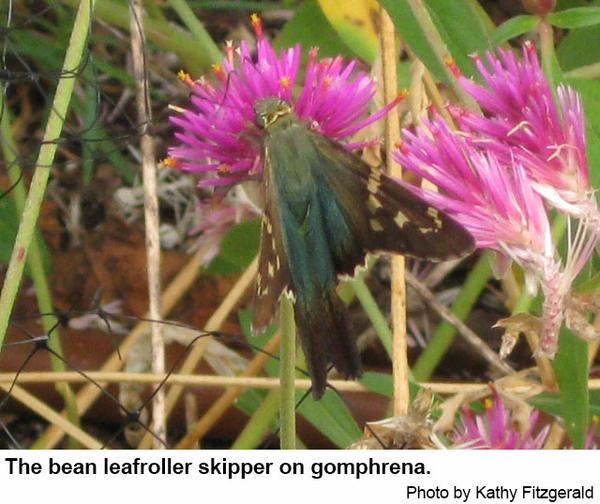Description and Biology
The bean leafroller skipper, Urbanus proteus, is also called the longtailed skipper. Skippers are insects sort of intermediate between butterflies and moths. Skippers tend to visit flowers during the day like butterflies, but they fly with a skipping motion. Another difference is that antennae are further apart on the head, and the antennae curve back at the tips whereas butterfly antennae are knobbed but not hooked at the tip. Bean leafroller skippers lay about 80 eggs on the lower leaf surface singly or in small groups. Three or four days later, the tiny bean leafrollers hatch and begin feeding.This species is called the bean leafroller because the caterpillar stage feeds on beans where older leafrollers roll the leaf up and feed within that shelter. Mature caterpillars are green speckled with black and yellow. There is a dark line down the back and two yellow lines down the upper sides. Skipper caterpillars are unusual in that they have a distinct neck and a relatively large head. The caterpillars mature in about two weeks and pupate inside the leaf roll. In a week or three, a new generation of longtailed skippers emerges from the pupae.
Host Plants
The bean leafroller caterpillar stage feeds on legumes and a few other crops where it rolls the leaf up and feeds within that shelter. Look for ragged and rolled up leaves. The bean leafroller is a very minor pest of beans in North Carolina, but it can be a real nuisance further south.
Residential Recommendation
Trichogramma parasites attack bean leafroller eggs. Tachinid flies and a tiny wasp parasitize bean leafrollers and paper wasps and predaceous stink bugs feed on them. A nuclear polyhedrosis virus is fatal to bean leafrollers as well. Sevin or some other pesticide labeled for vegetable pest management should give more than adequate control.
References
- Biology of the Bean Leafroller Urbanus proteus (Lepidoptera: Hesperidae). Dam, W. V. and G. Wilde. 1977. J. Kansas Entomol. Soc. 50 (1): 157-160.
- Common name: bean leafroller, scientific name: Urbanus proteus (Linnaeus) (Insecta: Lepidoptera: Hesperiidae). Capinera, J. 2011 (revised). Featured Creatures. Entomology & Nematology, FDACS/DPI, EDIS.
- Extension Plant Pathology Publications and Factsheets
- Horticultural Science Publications
- North Carolina Agricultural Chemicals Manual
For assistance with a specific problem, contact your local N.C. Cooperative Extension Center
This Factsheet has not been peer reviewed.
Publication date: Nov. 19, 2012
Reviewed/Revised: Oct. 9, 2019
The use of brand names in this publication does not imply endorsement by NC State University or N.C. A&T State University of the products or services named nor discrimination against similar products or services not mentioned.
N.C. Cooperative Extension prohibits discrimination and harassment regardless of age, color, disability, family and marital status, gender identity, national origin, political beliefs, race, religion, sex (including pregnancy), sexual orientation and veteran status.


